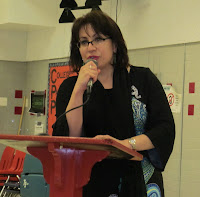Many challenges, few solutions offered at final Annandale Dialogue on Diversity

If the purpose of the Annandale Dialogue on Diversity was to open up lines of communication among an assortment of immigrants and people with deeper roots here, it accomplished its goals. But if the idea is to lay the groundwork for some sort of longer-lasting initiative aimed at cross-cultural understanding, we’ll have to wait and see if that happens.
At the final session, several dozen Annandale residents, including a contingent of students and several police officers, gathered in the Annandale High School cafeteria March 23 for food and conversation.
Facilitator Norma Lopez of the Fairfax County Department of Neighborhood and Community Services, categorized some of the key points made by participations at previous Annandale Dialogue on Diversity sessions:
- Communication—People have difficulty understanding English spoken by people with heavy accents.
- Norms—People violate property laws by having overcrowded houses.
- Safety—Immigrants are often unaware of traffic violation procedures. For example, people don’t know you are supposed to stay in your car when stopped by the police.
- Belonging—One participant addressed a feeling of dislocation by stating, “I am not from here but I am not from there.”
- Community—There is a lack of social capital. Connections with other people are important for a community’s well-being.
Lopez asked each table of participants to talk about issues that fall into those categories and identify additional challenges presented by living in a diverse community, then report back to the whole group.
Several people cited language issues, stereotyping, and economic constraints.
 |
| Lopez |
Even people with good English language skills struggle to understand the idioms, one group representative noted. Someone suggested it’s important for immigrants to learn about American culture, history, and holidays, as well as the language.
One person spoke about the difficulty of making time and finding the money for ESL classes. And someone else mentioned the role children are forced to play as “cultural ambassadors” and translators for their parents.
Sgt. N.I Butt, a Fairfax County police officer originally from Pakistan who moved here when he was 15 without knowing the language, said, “I felt isolated and disconnected in high school.” Addressing the stereotype issue, he said people tend to have a very different perception of him when they see him in street clothes, rather than his uniform.
Communication barriers extend beyond language, someone pointed out. People born here, for example, might think it’s rude not to make eye contact when you’re talking to someone, while in other cultures, it’s considered disrespectful to look someone in the eye.
 |
| Ferguson |
Arnoldo Borja, who is from Mexico and serves as an advocate for day laborers, said it’s difficult for immigrants to establish connections because they often work two or three jobs just to make ends meet. And when they’ve left their families at home, they feel even more isolated.
Some immigrants are confused by the laws here. Back home, several generations live together, and people don’t understand they can’t do that here because of zoning laws.
In El Salvador, “if you own your house, you can do whatever you want with it,” one man noted. And if you’re stopped by the police, you’re expected to offer some money. “If you do that here, you go to jail.” The tax system is lot more complicated here, he said, and so is the health care system. But women and children are treated with more respect in the United States, he added, and education is more highly valued here.
Other challenges cited at the meeting include the fear of not being accepted, generational barriers between parents and children, racism, discrimination, and the difficulty of getting a job without legal documentation.
The discussion on challenges took so long, there wasn’t much time to talk about solutions. One community resident suggested civic associations take a more active role in welcoming newcomers. Someone else encouraged people to take advantage of existing forums on diversity, such as Mason Supervisor Penny Gross’ monthly Kaleidoscope discussions.
“What does a community mean to you?” one immigrant asked. “This is a question we need to ask.” He called for patience, noting “If you raise expectations too high, you will be disappointed.”
Lopez said the Office of Neighborhood Services can provide assistance and help build leadership capacity if people want to develop their own bridge-building efforts. Capt. Bruce Ferguson of the West Springfield Police District urged the audience to continue efforts to promote dialogue among diverse groups. “You are the people dedicated to organize things in your community,” he said. “Who else would come out on a rainy Wednesday night?”


Thank you for this information. I have wanted to attend, but was unable. I have personally asked the Neighborhood Services in Fairfax County to look at the model of Prince William County to help build community here because Social Capital is severely lacking in some areas in Mason District. http://www.pwcgov.org/default.aspx?topic=010013001290004019
I have gotten no response from the Director of this Divison.
It has gotten so bad in some neighborhoods – the civic association no longer exists. We truly need the county's help on this.
The good news is that Ms. Lopez is going to speak about community building at one of our upcoming meetings for the Mason District Council. That is a start.
Mollie Loeffler
Fairfax County Citizen of the Year
Mason District Council organizer
Parklawn Civic Association President, and concerned Mason District Resident